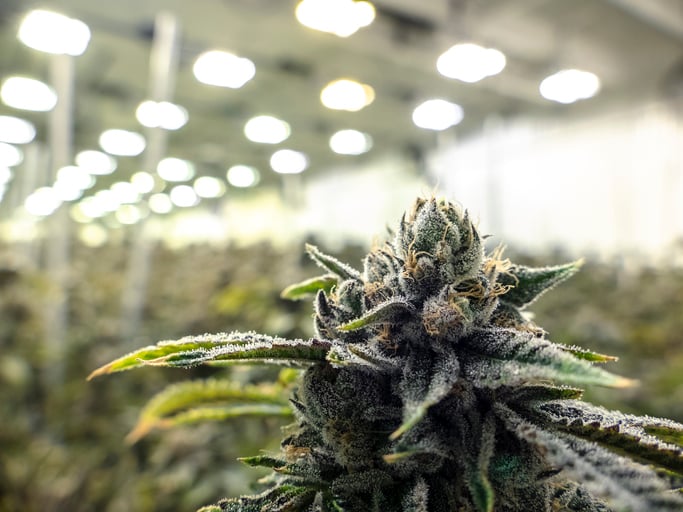The legal marijuana industry simply can't be stopped. According to a recently released report from cannabis research firm ArcView, in partnership with BDS Analytics, North American legal weed sales grew by 33% in 2017 to $9.7 billion, and they're now predicted to climb by an average of 28% on an annual basis through 2021. If this forecast proves accurate, we could be talking about $24.5 billion in annual legal pot sales by 2021. For added context, ArcView's and BDS Analytics' forecast from the prior year called for $21.6 billion in legal cannabis sales by 2021. Legal weed growth is even surpassing some of the most aggressive projections.
A big reason marijuana sales are roaring higher has to do with steady changes in the public's perception toward pot. Over numerous national polls in the U.S., the public has overwhelmingly responded in favor of legalizing marijuana for adult use. In a separate survey from the independent Quinnipiac University, 94% favored the idea of legalizing medicinal cannabis. As favorability has improved, and certain countries have become more receptive to the idea of legalizing medicinal marijuana and/or recreational cannabis, sales have soared.

Image source: Getty Images.
Within North America, the biggest near-term growth drivers appear to be California's opening its doors to recreational weed sales on Jan. 1, as well as the discussion of a bill in Canada's parliament that would legalize recreational marijuana for adults by this summer. Should Canada follow through and legalize adult-use pot, it would become only the second country in the world to have done so, behind Uruguay. It would also give the legal marijuana industry an opportunity to generate $5 billion a year in additional sales, if not more.
The most profitable marijuana stocks will be focusing on this product
For marijuana stocks, the number of pathways to generate a profit have been regularly broadening. What had once been a simple business model that involved dried cannabis growers, distributors, and dispensaries now has a bustling vertical network of related jobs to help the industry thrive. And, as you might imagine, figuring out which pot stocks offer the best path to profits isn't easy.
However, there is one type of cannabis product that I believe is the "clue" investors should be looking for in determining which marijuana stocks could be the most profitable. That product is none other than cannabis oils.
Believe it or not, dried cannabis is a relatively low-margin item. It's the most commonly sold cannabis product, and reasonably large amounts of supply suggest that margins will remain somewhat low. For example, with Canada on the verge of legalizing cannabis for adult use this summer, dozens of growers have been expanding their capacity as quickly as their balance sheets will allow. Companies that had been selling 4,000 or 6,000 kilograms of dried cannabis or cannabis equivalents a year are suddenly going to be producing 100,000 or 200,000 kilograms a year.

Image source: Getty Images.
Aurora Cannabis, which is building out its highly automated flagship facility known as Aurora Sky facility, and is acquiring CanniMed Therapeutics in the most expensive pot buyout of all time, is projected to produce between 240,000 and 270,000 kilograms in 2019. Meanwhile, three other companies are expected to surpass 200,000 kilograms of delivery, with at least one other at 140,000 kilograms. The sheer supply of dried cannabis should keep its price per gram, and thus margin, in check.
Meanwhile, cannabis oils and extracts have a significantly higher price point than dried cannabis, and this is one of those rare industries where margins and price tend to correlate. In other words, higher-priced products usually produce the best margins. This suggests that if two companies have equivalent sales, the one that devotes more of its attention to oils should generate a considerably better margin and profit.
Two pot stocks that could significantly benefit from cannabis oil sales
Though the data is a bit outdated, MedReleaf (NASDAQOTH: MEDFF) has long been a pioneer in pushing cannabis oil and extract products. In 2016, MedReleaf held 44.5% of all Canadian cannabis oil market share, although the company hasn't updated its share of the market since, and there have been a number of new entrants. Nonetheless, MedReleaf likely still possesses a significant share of the oils market.
For instance, during its recently reported fiscal third quarter, MedReleaf generated $1.82 million in sales from extracts, which was almost 700% more than it generated in the prior-year quarter. Despite suffering through a more than 20% year-over-year decline in the total average selling price per gram of dried cannabis, which pushed dried cannabis sales lower by almost $1 million from Q3 2016, the company still managed to grow total sales by 9% on the heels of a 94% increase in the average price per gram for extracts in Q3 2017. Oil and extract sales are simply that important, and they could give MedReleaf a clear leg up on its competition.

Image source: Getty Images.
The largest pot stock in the world, Canopy Growth Corp. (TWMJF 2.63%), should also benefit by incorporating oil sales, which includes is softgel capsule products. In the company's recently reported third-quarter operating results, it sold 262 kilogram-equivalents of oils, which was more than double the 116 kilogram-equivalents sold in the year-ago period.
Even more telling, oil sales as a percentage of Q3 2018 revenue climbed significantly year-over-year. Cannabis oils accounted for 23% of total revenue in Q3 2018, compared with just 13% of total sales in Q3 2017. These oil sales probably played a key role in pushing its average selling price per gram higher by 13% from the prior-year period, while reducing the cost per gram to the point of harvest by 32%. Though Canopy Growth is unlikely to be significantly profitable anytime soon as a result of reinvesting nearly all of its operating cash flow in capacity expansion, it should still be generating healthy margins from its cannabis oil operations.
If you're looking to dip your toes into the water by investing in marijuana stocks, pay close attention to the percentage of production companies are devoting to high-margin cannabis oils and extracts, as it could be a great indicator of future profitability.






